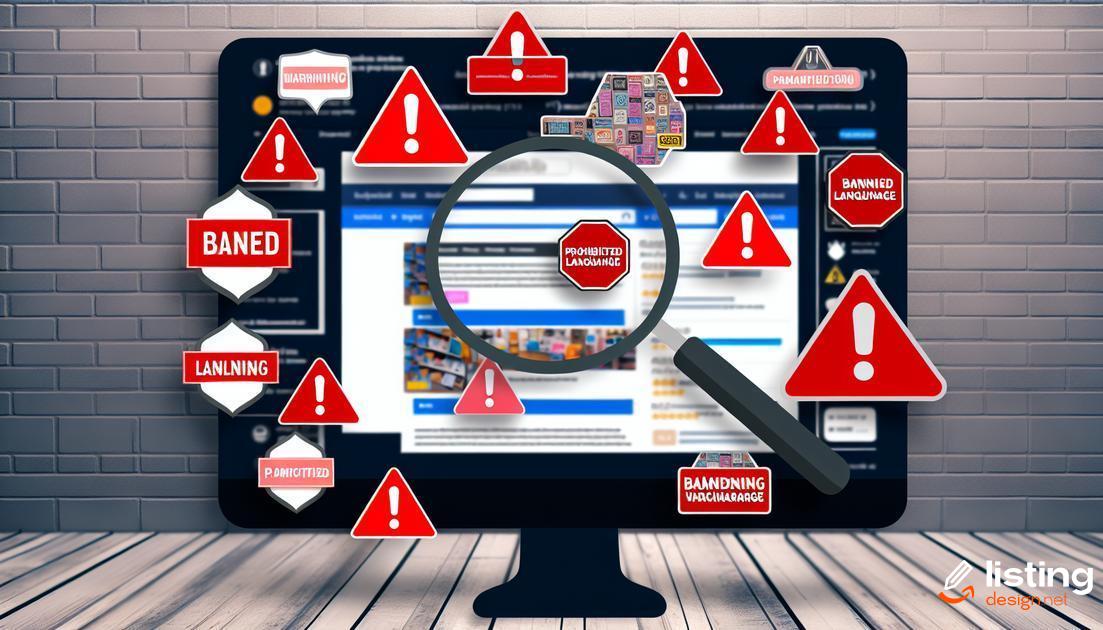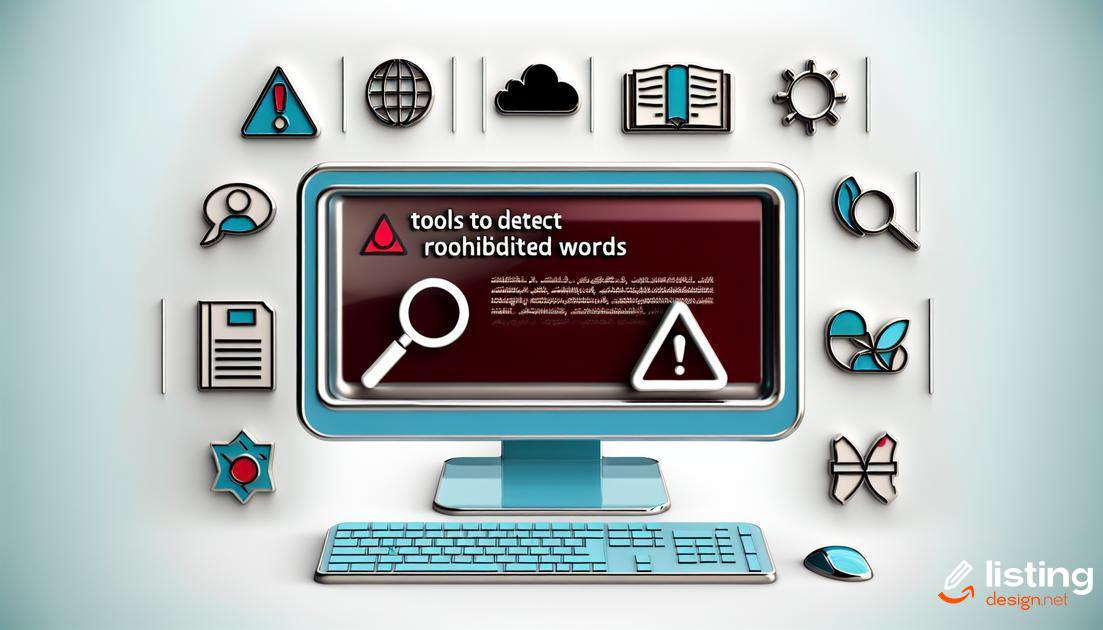Understanding the words prohibited on Amazon is crucial for maintaining a successful online store. Violating Amazon’s guidelines by using banned terms can lead to listings being removed or even account suspension. In this article, we will delve into the common prohibited words, their impact on your listings, and how to avoid them effectively.
Table of Contents
Commonly Banned Words
Amazon imposes strict guidelines regarding the use of certain words in product listings. The use of commonly banned words can lead to sanctions, ranging from listing suppression to complete account suspension.
Examples of Commonly Banned Words:
- Free: Any mention of free products or services, special offers, or incentives is prohibited.
- Guarantee: Terms that imply a guarantee may mislead customers and are against Amazon’s policies.
- Best: Claims stating that a product is the best or #1 are considered unverified and are not allowed.
- Illegal terms: Words related to illegal activities or products that violate local laws are strictly forbidden.
- Comparisons: Direct comparisons to competitors, such as ‘better than,’ can result in listing bans.
- Subjective terms: Words like ‘amazing,’ ‘top-rated,’ or ‘superior’ that can’t be objectively verified are not permitted.
Other prohibithed words on amazon listings:
- 100% natural
- 100% quality guaranteed
- Acquired Immune Deficiency Syndrome
- ADD
- added value
- ADHD
- AIDS
- All Natural
- ALS
- Alzheimers
- Antibacterial
- Anti-bacterial
- antifungal
- Anti-Fungal
- Anti-Microbial
- anxiety
- approved
- Arrive faster
- Attention Deficit Disorder Drug
- Authentic
- award winning
- bacteria
- best deal
- Best price
- Best seller
- Best selling
- big sale
- biodegradable
- biological contaminants
- bpa free
- brand new
- buy now
- buy with confidence
- Cancer
- Cancroid
- Cataract
- cataract
- certified
- Chlamydia
- closeout
- close-out
- CMV
- compostable
- Concusuion
- Coronavirus
- covid
- COVID-19
- Crabs
- Crystic Fibrosis
- cure
- Cytomegalovirus
- decomposable
- degradable
- Dementia
- Depression
- detoxification
- detoxify
- Diabetes
- Diabetic
- Diabetic Neuropathy
- Discounted price
- disease
- diseases
- don’t miss out
- dotoxifying
- eco friendly
- ecofriendly
- eco-friendly
- environmentally friendly
- etc.
- fall sale
- fda
- FDA Approval
- FedEx
- filter
- flawless
- Flu
- free gift
- free shipping
- Free shipping Guaranteed
- fungal
- Fungicide
- Fungicides
- fungus
- gift idea
- Glaucoma
- Gororrhea
- Great as
- Great for
- green
- guarantee
- guaranteed
- Hassle free
- heal
- Hepatitis A
- Hepatitis B
- Hepatitis C
- Herpes
- Herpes Simplex Virus 1
- Herpes Simplex Virus 2
- highest rated
- HIV
- Hodgkins Lymphoma
- home compostable
- hot item
- HPV
- HSV1
- HSV2
- huge sale
- Human Immunodeficiency Virus
- Human Papiloma Virus
- imported from
- indian
- inflammation
- Influenza
- Kidney Disease
- Lasting quality
- LGV
- limited time offer
- Liver disease
- Lupus
- Lymphogranuloma Venereum
- Lymphoma
- Made in
- mail rebate
- make excellent
- makes awesome
- makes great
- makes perfect
- makes spectacular
- makes the best
- makes wonderful
- marine degradable
- massive sale
- Meningitis
- mildew
- money back guarantee
- Mono
- Mononucleosis
- mould
- mould resistant
- mould spores
- Multiple Sclerosis
- multiple sclerosis
- Muscular Dystrophy
- Mycoplasma Genitalium
- Nano Silver
- native american
- Native American Indian or tribes
- natural
- newest version
- NGU
- non toxic
- noncorrosive
- Nongonococcal Urethritis
- non-toxi
- non-toxic
- now together
- On sale
- over- stock
- overstock
- parasitic
- Parkinson
- Parkinsons
- parkinsons
- patented
- peal
- Pelvic Inflammatory Disease
- Perfect for
- Perfect gift
- pesticide
- pesticides
- PID
- platinum
- plus free
- Professional quality
- proven
- Public lice
- quality
- Ready to ship
- recommended by
- remedies
- remedy
- Retail box
- SAD
- sad
- sanitize
- sanitizes
- Satisfaction
- Save $
- Save cash
- Save money
- scabies
- Seasonal Affective Disorder
- seen on tv
- Ships faster
- shop with confidence
- Special offer
- Special promo
- spring sale
- Stroke
- stroke
- summer sale
- super sale
- supplies won’t last
- TBIs
- tbis
- tested
- tested
- The Clap
- the clap
- Top notch
- top quality
- top rated
- top selling
- toxic
- toxin
- toxins
- Traumatic Brain Injuries
- treat
- treatment
- tribes
- Trich
- trichomoniasis
- tricht
- Tumor
- unbeatable price
- UPS
- Used
- validated
- viral
- virus
- viruses
- weight loss
- wholesale price
- winter sale
- Within hours
- worlds best
Understand and internalize these restrictions to ensure your listings remain compliant and visible to potential buyers.
Impact of Prohibited Words on Listings

Using prohibited words on Amazon can severely impact your product listings. When specific terms are flagged, your listings may be removed or suspended. This action not only disrupts your sales but also affects your seller rating. Amazon’s algorithm is adept at detecting banned words, ensuring compliance with their policies.
Prohibited words can include offensive language, misleading claims, or phrases that breach Amazon’s guidelines. The presence of these terms can result in loss of visibility, as your listings may be excluded from search results. This directly impacts your potential to attract and convert customers.
Visibility and Conversion
Without compliance, your listings won’t appear in relevant searches, leading to a significant drop in impressions and clicks. This lack of visibility diminishes your chances of conversion, impacting overall sales performance.
Furthermore, repeated violations may lead to more severe penalties, such as account suspension, which would require a strategic plan to resolve. Therefore, understanding and adhering to Amazon’s prohibited word policy is crucial for maintaining healthy listings and ensuring continued business growth.
How Amazon Flags Prohibited Words
Amazon employs a sophisticated automated system to detect and flag prohibited words in product listings. This system relies on an extensive algorithmic screening process that scans text descriptions, titles, and even bullet points for terms that violate its guidelines. These algorithms are continually updated to adapt to emerging trends and new illicit terms. When a potentially harmful or banned word is identified, the listing may be automatically suspended or flagged for further review.
Moreover, Amazon uses data from customer reports and its compliance team to fine-tune its detection methods. The platform can differentiate context to some extent, recognizing when a word is used in a benign context versus a prohibited one. Incorporating machine learning, Amazon’s system learns from past mistakes and improves its accuracy over time, minimizing false positives while ensuring harmful content is promptly flagged.
Amazon also provides sellers with tools and resources to help them stay compliant with its policies. Sellers can access guidelines and updates to understand the context of prohibited words better and avoid unintended violations. By using these resources, sellers can ensure their listings are safe and aligned with Amazon’s standards, maintaining the integrity of the marketplace.
Guidelines for Safe Listing Practices

To ensure your Amazon listings comply with platform policies and maintain high visibility, adhere to the following guidelines for safe listing practices
1. Avoid Prohibited Words: Refrain from using words flagged by Amazon’s system, such as claims about health or safety, words implying FDA approval, or words containing inappropriate language.
2. Use Accurate Descriptions: Ensure your product descriptions are truthful and align with the item’s actual use and functionality. Misleading claims can result in suspension.
3. Be Mindful of Keywords: While it’s important to use relevant keywords, stuffing your descriptions with excessive keywords or irrelevant terms can hurt your listing’s performance and visibility.
4. Review Amazon’s Latest Policies: Amazon regularly updates its policies. Keeping up-to-date with the latest terms and conditions can prevent accidental breaches that might affect your listings.
5. Monitor Customer Reviews: Check feedback for mentions of prohibited words and remove or amend listings that violate the guidelines.
Following these practices helps protect your account from penalties and enhances the overall customer experience, ensuring compliance with Amazon’s rigorous standards.
Case Studies: Banned Listings
Analyzing real-life examples of banned listings on Amazon can provide valuable insights into the types of words and phrases that trigger violations. These case studies often reveal common mistakes made by sellers, helping others avoid similar pitfalls.
For instance, one case study showed a seller’s product listing being flagged for using terms like ‘authentic’ and ‘genuine’, which Amazon deemed as unverifiable claims. Another example involved the use of words such as ‘free’ and ‘guaranteed’, leading to suspension until corrections were made.
Reviewing these examples demonstrates the importance of adhering strictly to Amazon’s guidelines. Sellers often underestimate the scrutiny listings undergo, but these cases clearly outline the repercussions.
Moreover, some sellers unwittingly include prohibited words in their product titles and bullet points, which Amazon’s algorithms quickly detect. These case studies highlight the critical need for thorough checks before publishing any listings.
Understanding the nature of these bans is crucial. Sellers frequently find themselves penalized because they do not fully grasp the nuances of Amazon’s rules. Analyzing past cases can not only illuminate the reasons behind such bans but also provide a roadmap for avoiding them.
Tools to Detect Prohibited Words

There are several reliable tools available that can help sellers identify prohibited words in their product listings. These tools are essential for maintaining compliance with Amazon’s strict marketplace policies. One popular option is Helium 10, which includes a feature that scans listings for banned words. Another effective tool is Jungle Scout, offering a comprehensive checking system for restricted keywords.
Keyword Inspector is another resource that can analyze your listings for terms that Amazon may flag, helping prevent the suspension of your selling account. Additionally, ZonWords provides seo audits, including checks for prohibited terms. These tools not only highlight the prohibited words but often suggest alternatives that comply with Amazon’s policies.
Regularly using these tools can save a lot of time and ensure that your listings stay within Amazon’s guidelines. Implementing proactive measures with these resources aids in avoiding potential listing suspensions or account terminations. Also, staying updated with Amazon’s policies through these tools can help in swiftly adapting to any changes they introduce.
Amazon’s Policies and Updates
Amazon frequently updates its policies to ensure a safe and trustworthy marketplace. Sellers must stay updated with these changes to avoid penalties. Policies cover various areas such as product descriptions, images, and customer communications. Regularly reviewing the Amazon Seller Central updates helps sellers stay compliant.
One significant policy update is the usage of prohibited words. Amazon’s algorithms scrutinize listings for specific terms that might mislead or violate regulations. Sellers should familiarize themselves with the latest banned keywords list to avoid complications.
Amazon also introduces new features aimed at improving seller compliance. Tools such as automatic keyword detection and listing quality checks are now part of the seller toolkit. Leveraging these tools can help sellers maintain high-quality, compliant listings.
Amazon enforcement mechanisms
include warnings, listing removal, and account suspension. It’s crucial for sellers to understand these penalties and the appeal process. Staying informed about policy updates can mitigate risks and promote a smoother selling experience.
Navigating Language Restrictions

When selling on Amazon, understanding and navigating language restrictions is crucial for maintaining a compliant and successful listing. Amazon enforces strict guidelines to ensure that product descriptions are appropriate, non-deceptive, and align with their policies. Sellers must be mindful of the words and phrases that are prohibited, as using these can lead to listing removals or account suspensions.
Prohibited terms often include language that might mislead customers, infringe on trademarks, or violate advertising regulations. For example, words implying a guarantee (‘guaranteed’, ‘best’) or those making health claims (‘cure’, ‘prevent’) are typically restricted. This also extends to any form of inappropriate or offensive language.
To avoid these pitfalls, sellers need to regularly review Amazon’s policies and updates regarding language use. Adopting a conservative approach when listing products can also help in preventing unexpected issues. If unsure about the acceptability of certain terms, it is advisable to seek guidance from Amazon’s seller support or utilize specialized tools designed to detect prohibited words.
Understanding the intricacies of these restrictions and keeping abreast with Amazon’s evolving policies is key to ensuring your listings remain active and compliant, thus safeguarding your seller account from potential penalties.
Phrases and words prohibited on amazon 2024
Guarantee Keywords:
Approved, certified, Guarantee, proven, recommended by, tested, validated, buy with confidence, unlike other brands, best selling, high quality
Ingredients that are prohibited to be sold on Amazon and to avoid use in copy:
hordenine, minoxidil, ayahuasca, levodopa, carbidopa, picamilon, ketoconazole
Drug Keywords:
CBD, cannabinoid, THC, full spectrum, hemp oil, marijuana, amanita muscaria, clenbuterol, coca leaves, drugs, codeine, damiana, DMT, dimethyltryptamine, drotebanol, ephedrine, ergotamine, pseudoephedrine, psilocybe cubensis, psilocybin, salvia divinorum, sonoran song, mimosa hostilis, syrian rue, Wild Dagga, Yopo Seeds, Hawaiian Baby Woodrose, Argyreia Nervosa seeds, Jimson Weed, Kanna, Ketamine, Klip Dagga, Kratom, Stimuli
Skincare Keywords:
Brightening, Whitening, Lightening, Anti-bacterial, Bacteria, Antimicrobial, Antifungal, Anti-inflammatory, Inflammation, Safe, Wound, Non-poisonous, Non-injurious, Harmless, Non-toxic, Contamination, All natural, Germ, Germs, Detox, flawless, heal, detoxify, detoxifying, detoxification, itchy, renewal, renewing
Eco-Friendly Keywords:
Biodegradable, Eco friendly, Hypoallergenic, Environmentally Friendly, Carbon-Reducing, Green (not the color but recycling), environmental benefits, compost, claims, non-toxic, “free-of” claims, Organic, compostable, decomposable, degradable, eco-friendly, filter, home compostable, marine degradable, vegan
Disease Claim Keywords:
Cancer, Cure, FDA, Sanitize, Sanitizes, Covid, COVID-19, Coronavirus, weight loss, treatment, disease, toxin, toxins, parasitic, chlamydia, Gonorrhea, Hepatitis, (Sex Terms in general), Herpes, HIV, AIDS, Crabs, Alzheimers, Dementia, Parkinsons, Diabetes, Influenza, Meningitis, treat, remedy, remedies, diseases, Cancroid, Cytoretinolcmegalovirus, CMV, Human Papilloma Virus, HPV, The Clap, Herpes Simplex Virus 1 & 2, HSV1, HSV2, Human Immunodeficiency Virus, Acquired Immune Deficiency Syndrome, Lymphogranuloma Venereum, LGV, Mononucleosis, Mono, Mycoplasma Genitalium, Nongonococcal Urethritis, NGU, Pelvic Inflammatory Disease, PID, Pubic Lice, Scabies, Trichomoniasis, Trich, Liver Disease, Multiple Sclerosis, Kidney Disease, Stroke, Diabetic, Flu, reduce anxiety, medication, relief, deficient
Pesticide Claim Keywords:
yeast, fungus, antimicrobial, anti-microbial, antibacteria, antibacterial, anti-bacteria, anti-bacterial, microbial, bacteria, bacterial, virus, viruses, microbes, protozoa, coronavirus, covid, disease, pathogen, antifungal, anti-fouling, CONTAMINATION, DETERIORATION, mildew, mold, mould, mold resistant, mold spores, non-toxic, noncorrosive, toxic, fungicides, fungicide, fungal, non-poisonous, N95, KN95, wick, wicking, mites, ringworm
Misc Banned Keywords:
- Native American, indigenous, tribes, platinum, pearl, screw, pharmaceutical
A+ Banned keywords:
- “Add to cart”
Also Avoid Using:
- Trademark/Brand Names
- Author Names
- Profanity
- Don’t use subjective commentary, such as “Hot Item” or “Best Seller”.
- Don’t use non-language ASCII characters such as Æ, ©, or ®.agi
- Terms encouraging a negative body impression (weight loss, overweight, etc.)
- Terms addressing Sex (unless a certified adult product)wireless
Amazon Product Title Requirements:
- Titles must not exceed 200 characters, including spaces.
- Titles must not contain promotional phrases, such as “free shipping”, “100% quality guaranteed”.
- Titles must not contain characters for decoration, such as ~ ! * $ ? _ ~ { } # < > | * ; ^ ¬ ¦
- Titles must contain product-identifying information, such as “hiking boots” or “umbrella”.
- Titles must not contain gifts phrases
FTC Green Guides for Eco-Friendly products:
- Avoid broad, general claims regarding a product’s environmental benefits or qualities (ex., avoid “eco-friendly” or “environmentally friendly” or “green”).
- All claims about a product’s environmental benefits or qualities should be specific, and all qualifications (or limitations) to environmental claims must be specific, clear and prominently displayed (ex., “product is made from 20% recycled materials”).
- Narrowly tailor environmental claims so as not to overstate the environmental benefits or qualities.
- Avoid making environmental claims if the environmental benefits or qualities are negligible.
- When making comparative environmental claims, the basis for the comparison must be clearly conveyed.
- Distinguish between products, packaging and services when making environmental claims (ex., packaging is 100% biodegradable).
- Avoid making compostable claims without qualification if the product cannot be composted at home safely or in a timely way.
- A general degradable or biodegradable claim should only be made if the entire product will completely break down and return to nature within a reasonably short period of time after customary disposal (or one year for solid waste products). If the product customarily ends up in landfills, incinerators, or recycling facilities, then a general biodegradable claim should not be made.
- An environmental claim that a product or packaging is made from recycled materials should accurately reflect the portion that is made from recycled materials (ex., “made from 20% recycled materials”).
- Carefully consider certifications and seals and include the specific basis or environmental benefit for the certification whenever it is used. For questions regarding certifications, see http://ftc.gov/os/2009/10/091005revisedendorsementguides.pdf.
- The FTC Green Guides also address other environmental claims, including: (1) Free-Of claims, (2) Non-Toxic claims, (3) Recyclable claims, (4) Renewable Energy claims, and (5) Renewable Materials claims. If you are making these or other environmental claims, please review the FTC Green Guides.
Claims:
- Your page contains a claim that is not substantiated. All claims must be supported by an independent third-party source either on the product detail page, within the Store, or on the product packaging and can’t be older than 18 months. Please provide the necessary substantiation or remove this content from your page.
- (e.g., recommended by, certified, tested, approved, proven, validated, etc) and awards must be substantiated by a note in the text with certifying or awarding body, study, publication, or other evidence, and year. Awards must have been granted in the last two years.
Weight Loss / Fat Burner Supplements:
- Ads must not speak directly to customers, such as “Tired of being overweight?”, nor make any unrealistic or excessive claims, including, but not limited to:
- Encouraging unhealthy eating or negative body image/self-perception.
- Product Targeting must be directly related to te product promoted.
- Substantial weight loss no matter what or how much the customer eats.
- That customers can lose weight by merely using the product without following a calorie-controlled diet or exercise program.
- That results are effective for everyone, or that they are permanent.
- That a customer will lose weight by wearing a product on the body or rubbing it into the skin.
- That the product can burn fat, increase metabolism, suppress appetite, or expedite other natural bodily functions.
- Weight loss of a specific amount over a defined period of time.
Here is a full list of prohibited actions with Enhanced Brand Content:
- Referencing your company as a seller or distributor, or providing any company contact information.
- Mention of competitor’s products or seller authorization such as “product only sold by authorized resellers”, etc.
- Pricing or promotion information and shipping details “cheapest widget on Amazon” “Free shipping”, “shipping timelines”, etc.
- Use of copyright, trademark, or registered symbols in the text or images.
- Time-sensitive product information: “on sale now” or “best new product of the year” and comments such as “top-selling product,” “hottest item,” “#1 Selling item”.
- Information about customer reviews from Amazon or any other site.
- Adding editorial or 3rd party quotes from external sources such as magazines and television shows.
- Blurry or low-quality images or images containing unreadable text. Lifestyle images not showing the product.
- Images or text that attempts to mimic Amazon logos, detail page headings or details.
- Content that duplicates many of the images from the main image block on the detail page
- Any warranties or guarantees of any form.
- Logos from brands or organizations other than your own, or multiple brand logos on an image.
- Web links or language attempting to redirect to other sites inside or outside of Amazon (including your other products).
- Grammatical errors, punctuation errors, misspellings, strings of all caps text, or abusing font features – Bold and Italics are only intended to be used to highlight headings or a few select words.
- Any mention of products being used for criminal activity.
- Any violations of category requirements or Selling on Amazon policies.
Negative Connotations:
- Fooled
- Cheap
- Anniversary Gift
- Anniversary Gifts
Hazardous and prohibited items NOT eligible for remote fulfillment in Canada & Mexico:
- Products containing Bisphenol A (BPA). Items containing carbon tetrachloride, such as: Fire extinguishers, Refrigerants, Cleaning agents.
- Any chemical substance or compound that is intended for commercial, industrial, or professional use only and is not available for general consumer purchase.
- Explosives, such as: Black powder, Caps for toy guns, Explosive fuses, Exploding rifle targets. Fireworks, such as: Firecrackers, Firework kits, Aerial bombs, Bottle rockets,
- Party poppers, Roman candles, Smoke bombs, Snap caps, Sparklers. Flares, such as projectile and road flares, Flash paper, Gasoline.
- Sky lanterns or floating lanterns, Bacteria cultures or other products containing E coli or Escherichia coli, Hydrofluoric acid
- Inflatable neck floats for children, Face masks intended for use by infants, Padded crib bumpers and similar accessories, including vertical crib slat covers and top rail covers
- Information on how to make explosive devices, such as bombs
- Kite strings that are intended for kite fighting, Military-style gas masks and their filters
- Nitric acid, Sodium azide, Ethanolamine, Products containing red phosphorus, Products containing thermite, Products containing tritium that do not comply with the regulations of the United States Nuclear Regulatory Commission
- Products that do not comply with the Safe Drinking Water Act, Used oil, such as cooking oil or motor oil, Water walking balls
- Products contaminated by radiation,
- Liquid mercury and products containing mercury, such as:
- Automotive switches, relays, and diostats, Batteries, with the exception of alkaline-manganese button cell batteries containing up to 25 mg of mercury, Manometers, sphygmomanometers, and other medical devices containing mercury, Mercury-added consumer novelty products such as toys, games, cards, jewelry, apparel, and footwear, Thermometers, Thermostats, Wheel weights
- Products containing cyanide
- Individual, novelty magnets and novelty magnet sets that are marketed or commonly used for entertainment, such as puzzle working, sculpture building, mental stimulation, or stress relief are prohibited for sale. The following magnet set brands are specifically prohibited for sale:
- Buckyballs, Buck balls, Buckybars, Bucky Bigs, Buckycubes, CyberCube, DynoCube, Hurry Harris balls, Magnicube (also called Mag Cube), Neocubes, Neocubix, Nanodots, Neo spheres, Puzzle Spheres (ONLY if they are magnets or magnetic), Zen magnets set
- Vehicle airbags and airbag covers, Toy crossbows that have the capability of shooting small, sharp projectiles (e.g., toothpicks, pins), Elephant sleep pillows, Infant inclined sleep products, Framed-type inclined sleep products, Hammocks, Compact inclined sleep products, including but not limited to: Nap Nanny brand infant sleep products. Accessory inclined sleep products, Infant inclined sleep product replacement parts and accessories
- Lawn darts, Scalar quantum energy products, Throwing star fidget spinners, Amber infant teething products, Infant inclined sleep products, Children’s upper body drawstring clothing, Fidget spinner lighter knives, Drop side cribs
- IMDEN brand magnetic building tiles, Eclipse glasses and filters for solar viewing, Motor vehicle fabric restraint systems
Ingredients That Sometimes Require Documentation (avoid in copy if possible):
- Grapefruit Oil
- Joint/Arthritis Supplements:
- joint pain, free redicals, pain relief


